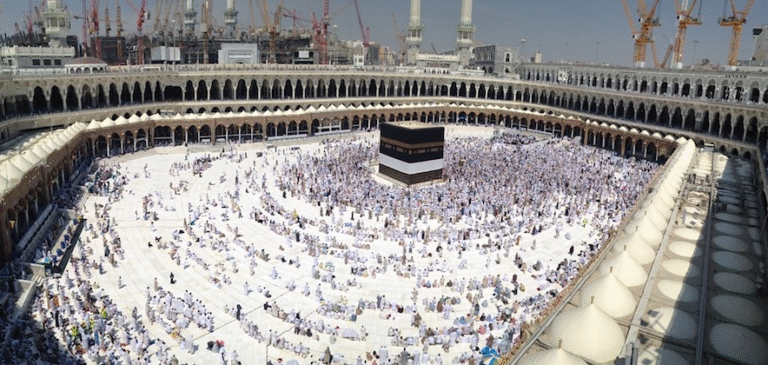In world history, the spread of Islam was one of the most significant events. During the 7th century, Islam expanded quickly from its starting point in Arabia to various regions in Africa, Asia, and Europe. Politics and militaries were not the only factors in this historical expansion. It also has to do with the spreading of traditions, principles, and concepts. Islam had a deep impact on world civilization as it expanded. It influenced social life, trade, law, science, and art. The spread’s tale highlights the power of faith to unite people and generate a significant impact on human history.
The Early Spread of Islam
With the teachings of the Prophet (PBUH), Islam had its beginnings at Makkah. There were not many followers at the start. But over time, more people started to accept the message of justice, equality and oneness of Allah. Islam acquired dominance in Arabia after years of disputes and battles. Islam had spread throughout 99% of the Arabian Peninsula by 632 CE when the Prophet (PBUH) died. The teachings of the Quran and the Prophet (PBUH) Served as a directions for the early Muslim community. They established an honest, socially responsible and fair society. Islam became more attractive for people as a result of these values.
Expansion under the Caliphates
Muslim leaders known as Caliph kept trying to guide community after the death of Prophet Muhammad (PBUH). The historical expansion of Islam was greatly influenced by first four Caliphs. They are also referred as the rightly guided Caliph. Muslim armies arrived Iraq, Egypt, Persia and Syria just in few of decades. It continued to expand later under the Abbasid and Umayyad Caliphates. Spain, Central Asia, North Africa and some parts of India were all under the Muslim control. Battles were not the only way this expansion occurred. The teachings of Islam were also spread by trade, travel and through scholars and teachers.
The Role of Trade and Culture
Wars and battles were not the only way to spread of Islam. Islam spread over seas and deserts thanks to Muslim Traders. They made their way to Southeast Asia, India and East Africa. Islam was mostly spread by trade and friendly ties with nations like Malaysia and Indonesia. Many other found Muslim culture to be attractive. Islam gained honor because of its focus on brotherhood, fair, trade and integrity in business. Islam gradually gained acceptance among local authorities and communities, becoming a part of their way of life.
Impact on World Civilizations
World civilizations were deeply influenced by Islam’s historical expansion. Muslims established robust societies, educational institutes and hubs for learning wherever they went. They introduced new discoveries while preserving the old. Europe, Africa and Asia were influenced by their efforts.
1. Science and Knowledge
Muslims gained significant advancements in astronomy, medicines, mathematics and science. Algebra was introduced by Al-Khwarizmi. For ages, people used the medical book written by Ibn- Sina. Later, this knowledge made its way to Europe, where it contributed to the beginning of the Renaissance.
2. Art and Architecture
Beautiful art and exquisite architecture are hallmarks of Islamic civilization. Calligraphic, minarets and some-topped mosques became cultural icons. Examples of this are Blue mosque in Turkey and Alhambra in Spain. Other cultures were also influenced by the emphasis on design and arts.
3. Trade and Economy
Muslim territories turned into trade hubs. Gold, silk and spices were transported over great distances. Trade routes encouraged the spread of Islam between the west and the east. Many civilizations achieved new products and income as a result of this trade.
4. Law and Society
Islam also influence social life and law. Care for the needy and the concept that all are equal before Allah had a significant impact. Fair and balanced societies were influenced by practices like honest business contracts and zakat. People from a variety of backgrounds agreed on these values.
Islam in Africa, Europe, and Asia
With the help of traders and teachers, Islam expanded through the Africa’s Sahara. Urban cities like Timbuktu developed into educational hubs. Islam has deep impact on Spain in Europe. Muslim Spain was a cultural, scientific and artistic hubs for ages. It developed into bridge between European and Islamic civilization. Islam made its way to Central Asia, Southeast Asia and India. It had an impact on Indian art, language and architecture. Islam influenced the Southeast nations like Indonesia which is currently the largest Muslim country, by combining with local customs.
The Peaceful Side of Expansion
It is important to remember that armies were not the only way for the spread of Islam. Teachings of Islam on compassion, justice and equality contributed to widespread acceptance of Islam. The peaceful spread of Islam received significant support by Sufi teachers. Many felt inspired by their emphasis on kindness, unity and close relationship with Allah. This peaceful expansion shows that Islam was not just a political power, but also a spiritual and cultural one. People from diverse places and backgrounds were attracted to its values.
Lasting Legacy on World Civilizations
The effects of Islam’s historical expansion can be clearly seen today. Islamic culture became the part of global history. Arabic words made their way into many other languages. Along with Muslim traders brought foods, clothing and idea spread throughout various societies. The lessons of Islamic teachings are still relevant today. The focus on kindness, equity and education never stops motivating.
